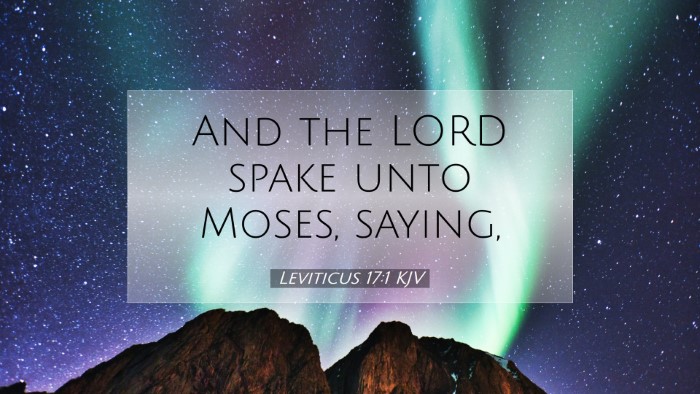Commentary on Leviticus 17:1
Verse: "And the LORD spake unto Moses, saying," (Leviticus 17:1)
Introduction
This verse marks a critical juncture in the book of Leviticus, which serves as a manual for the Levitical priests and details the holiness code and sacrificial system that governs Israelite worship. The Lord's directive to Moses signifies not only divine authority but also the importance of obedience and understanding the meaning behind sacrificial practices.
Divine Communication
Matthew Henry emphasizes that this communication represents the ongoing relationship between God and His chosen leader, Moses. God speaks directly, underscoring the significance of prophetic revelation in guiding the nation of Israel. Each command given to Moses carries with it a weighty responsibility for the people to adhere to the divine will.
The Role of Moses
Moses serves as the intermediator between God and the people. Albert Barnes notes that Moses is often portrayed as a faithful servant who conveys God's desires, ensuring the people remain in covenantal relationship with Him. This verse establishes the authority Moses has to instruct the Israelites as God’s spokesperson.
Sacrificial Context
Leviticus 17 introduces regulations concerning sacrifices, which are central to Israelite worship. Adam Clarke points out that understanding the sacrificial system is fundamental for grasping the overarching themes of atonement, worship, and divine holiness that permeate the Torah. This chapter emphasizes that sacrifices must be made exclusively at the tent of meeting to prevent idolatry and ensure proper worship.
Holiness and Sacrifice
Matthew Henry expands on the necessity of holiness in sacrifices, suggesting that the manner in which sacrifices are conducted reflects the inner spiritual condition of the people. The call to proper sacrifice illustrates broader themes of repentance and the need for atonement in the life of believers.
- Prescribed Locations: Sacrifices must not be offered in the fields or elsewhere, as this could risk corrupting the sacred act of worship.
- Significance of Blood: The instructions on handling blood point to its spiritual significance, as blood is seen as the life of the flesh, which plays a pivotal role in atonement.
Theological Implications
This verse sets the stage for deeper theological reflections that resonate throughout Scripture. Albert Barnes discusses how this directive foreshadows the ultimate sacrifice of Christ, drawing connections to the New Testament where Jesus fulfills the sacrificial system through His death and resurrection. Such insights challenge pastors and theologians to explore the continuity of God's redemptive plan as revealed through both the Old and New Testaments.
Continuity of God’s Instructions
God’s continual communication, as exemplified in Leviticus 17:1, highlights the importance of divine guidance throughout the ages. Matthew Henry reiterates that the principles established in Leviticus continue to impart wisdom for understanding the nature of sin, sacrifice, and the necessity of atonement within the Christian tradition.
Applications for Today
Today’s believers are called to recognize the underlying principles of holiness and reverence toward God presented in this chapter. Adam Clarke urges modern readers to reflect on the heart behind worship practices, stressing that true worship is characterized by sincerity and adherence to God's standards rather than mere ritual compliance.
- Worship in Spirit and Truth: Jesus’ conversation with the Samaritan woman highlights the shift toward worship that transcends physical locations, requiring a heart aligned with God.
- Importance of Community: The communal aspect of worship in Leviticus illustrates how believers are interconnected in their faith journey, teaching the significance of accountability and mutual support within congregations.
Conclusion
Leviticus 17:1 sets a profound precedent for understanding the relationship between God and His people, emphasizing God’s active role in covenant life. By exploring the historical and theological implications of this verse through the lenses of Matthew Henry, Albert Barnes, and Adam Clarke, we grasp a richer meaning that informs both personal faith and communal worship. It invites pastors, students, and scholars alike to delve deeper into the text, drawing connections that resonate with God’s ongoing narrative of redemption.


